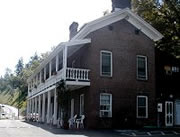A CITY BUILT ON GOLD
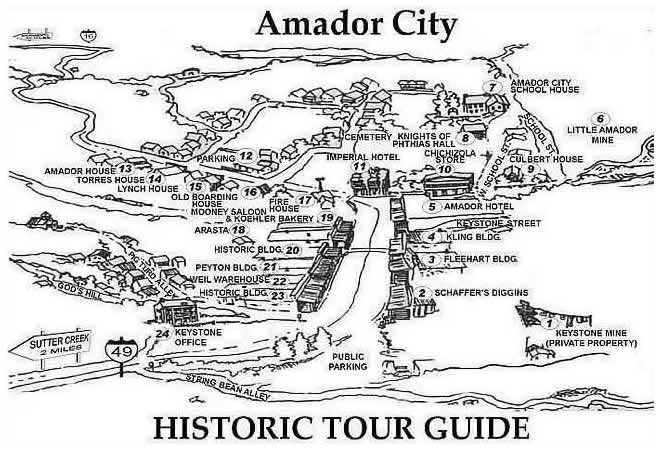 Several hundred yards upstream from today’s town site, Jose Marie Amador, a wealthy California rancher, mined along this nameless creek in 1848-1849. There, gold outcroppings were discovered on both sides of the creek. The Original or Little Amador Mine and the Spring Hill Mine were likely the country’s first gold mines. Soon, the creek, the town and a new county carried Amador’s name.
Several hundred yards upstream from today’s town site, Jose Marie Amador, a wealthy California rancher, mined along this nameless creek in 1848-1849. There, gold outcroppings were discovered on both sides of the creek. The Original or Little Amador Mine and the Spring Hill Mine were likely the country’s first gold mines. Soon, the creek, the town and a new county carried Amador’s name.
As the “easy” gold was mined out on the upper part of the creek, mining and encampments gradually moved to “South Amadore” where French Gulch flows into the creek. This is the current site of Amador City. The Keystone Mine, organized in 1853, was the city’s most famous gold mine and a major reason why the town grew. In those days there were an estimated four to six thousand residents in Amador City! Before closing in 1942, an estimated $24,000,000 in gold had been mined.
Amador City’s oldest structure, built around 1855, is the center portion of the Amador Hotel. Up Main Street is the stone Fleehart Building (now the Whitney Museum) was the Wells Fargo Building and dates from the 1860’s.
Below are historic sites throughout Amador City in the California Gold Country.
1. Consolidated Keystone Mine
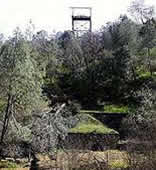
Founded in 1853 from a consolidation of two or more small claims. It reached a depth of 2,680 feet and produced about $24 million in gold. Keystone’s early years were plagued with production and ownership problems; luckily, a rich new vein was discovered in 1866, enabling the mine to yield a monthly gold production average of $40,000, making the Keystone one of the most lucrative California mines. The Keystone mine was closed in 1942 when the government closed all operations that did not pertain to the war effort.
2. Schaffer’s Diggins
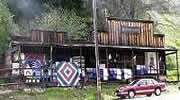
No recorded history. One of the most photographed buildings in town.
3. Fleehart Building
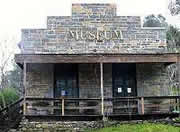
Probably Amador City’s oldest building, dating from the 1860s or earlier. William Fleehart was an early day mine owner, merchant and Wells Fargo agent. It may also have been an early Keystone company store. The Fleehart was the only store building to survive the big fire of 1878. The building has since been donated to the city and houses the Amador Whitney Museum.
4. Kling Building
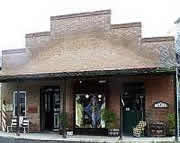
Kling’s saloon burned down in the June 1878 fire. The present brick building, completed in January 1878, housed George Kling’s saloon on the south side and Hewitt and Hammack’s dry goods and grocery on the north side. The north side later housed a justice of the peace, a cobbler’s shop and an assay office. At one time the front bricks were removed so that it would be wide enough to accommodate cars in a working garage. In July 1879 Kling graded the lot between his new brick saloon and Kirkland’s stone store (the Fleehart building) and built a frame store, which was evidently torn down.
5. Amador Hotel
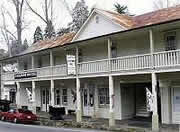
The main entrance section was built around 1855. This section escaped the fire of 1878. In 1872, owner Harrington completed a new and commodious hall which was used as a town hall, and later as a dining room. In 1876 he nearly doubled the square footage, adding a drug store, doctor’s office and other apartments to meet demand. It was used continuously as a hotel until the 1940s, and reportedly housed ladies of the evening during some periods. It is believed to be Amador City’s oldest structure. The building has been completely renovated. Behind the Amador Hotel building is a peaceful courtyard and garden.
6. Original Amador Mine (Little Amador)
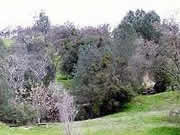
Named “original” because two early mines were “Amador Number One” and “Amador Number Two”. This and the Spring Hill Mine (across Amador Creek) were the first gold mines in Amador County. Headframe and footings of the stamp mill are still visible. It was one of the first quartz mines producing into the late 1870s. It continued to be mined until 1937.
7. Amador Schoolhouse
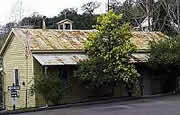
Front part either dates from 1857 or late 1864. Back wing dates from late 1878 to early 1879. Two large classrooms in the new part and two smaller rooms in the older front part handled 150 or more students with five teachers during peak years. A special registry kept of former students has an entry for a graduate in 1909. This building is now City Hall, the Community Center. Amador City was incorporated in 1915.
8. Knights of Pythias Hall
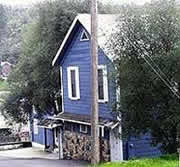
The local chapter of this fraternity was organized in December, 1877, the 46th lodge of the order in the state of California. The wood frame building survived the fire of 1878. Behind the old schoolhouse and the Imperial Hotel is the cemetery, which is open to the public. Access to the cemetery is via Church Street; go past the Imperial Hotel on Highway 49 and turn right on Church.
9. Culbert House
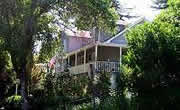
Circa 1870. Originally two houses, lived in by John Culbert’s grandmother and her sister. The Culberts were a pioneer family in Amador City prominent in ranching, logging, and mining. John Culbert and his wife combined the two houses into one and filled it with an extensive antiques collection. Until recently it was a Bed and Breakfast Inn; now it is a private residence.
10. Chichizola Store
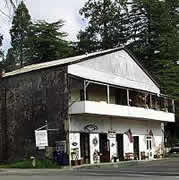
The western half of the building was completed in November 1877, and the other half within the decade. A general store, run by the Chichizola family, having just about everything imaginable, was so cluttered that merchandise was hung from the ceiling rafters. Now the town Post Office is in the center section.
11. Imperial Hotel
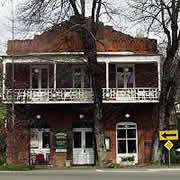
On the site before the June 1878 fire was a wooden hotel. Afterwards, owner B. Sanguinetti erected a two-story frame addition behind the hotel to house the overflow, which was removed years later. It remained a hotel until 1927. Careful restoration has returned the building to its original use. Six individually decorated rooms, each with private bath, once again welcome guests. The fully stocked Oasis Bar, elegant dining room, and innovative menu at the Imperial Hotel create ideal dining. The new courtyard is highlighted by fountains, waterfalls, flower gardens and century-old walls of native stone.
12. Historical Building
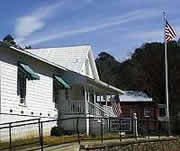
An old residence with no recorded history.
13. Amador House
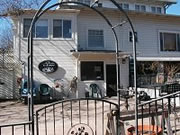
This building was erected in the early 1900’s as a private residence for the Torres family who owned and ran the business next door (#14).
14. Torres Hall
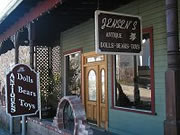
Built c. 1869. The lower level was used for horse and buggies, and bocce ball games. The upper floor burned in 1879 and rebuilt in 1889. Originally a mercantile store with one side a saloon and Italian restaurant. Above the top floor was a “floating” dance floor with a stage at one end. All night dances were held there with midnight suppers; later used a movie theater.
15. Lynch House
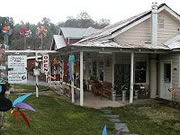
Built as a private residence and occupied by the Lynch family. The father and son both lived in the house and practiced medicine in one room of the house.
16. Old Boarding House
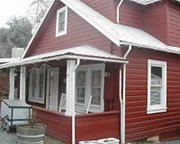
Built as a private residence in early 1900’s; the owner provided room and board to the local miners.
17. Firehouse
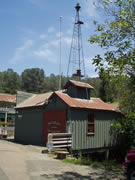
Built by volunteer firemen in early 1900’s on the site of the old livery stable.
18. Arastra
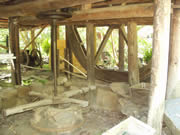
Found in El Dorado County, dismantled, and reassembled here in the 1960’s. Used to crush ore during the gold rush. Large stones, turned by water power or mules, turned in circles crushing the ore.
19. Mooney Saloon and Koehler Bakery
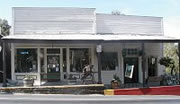
Rebuilt after 1876 and 1878 fires. German baker Koehler built a lucrative business, which included a bakery, candy store and saloon. The oven, still present, baked its last loaf of bread in 1917. The Mooney saloon, which reopened in 1880 after the last fire, later became a Chinese restaurant operated by former Chinese miners.
20. Historic Building
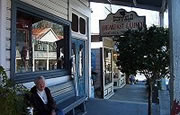
William Peyton may have owned a saloon here. The building remained a saloon through the 1920’s.
21. Peyton Building
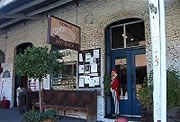
After 1878 fire, Peyton erected a brick building for another saloon, but in 1879 rented it to J.R. Dunlap for a drug store and post office. Later used as a general store where gasoline was sold for the “tin Lizzies”.
22. Weil Wareroom
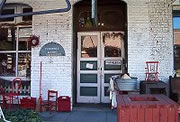
Rebuilt after 1878 fire; housed a mercantile business operated by Mr. Weil. Later occupied by the Keystone Supply Co.
23. Historic Building
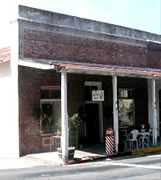
Probably built after the 1878 fire. It once housed the post office and Western Union office as well as a general store. The elevated stage suggests entertainment in a saloon.
24. Keystone Consolidated Mining Company Office
